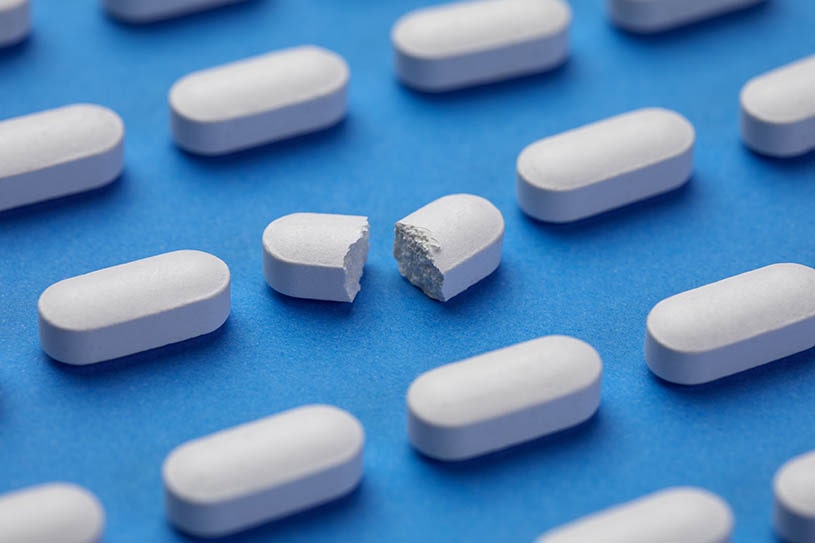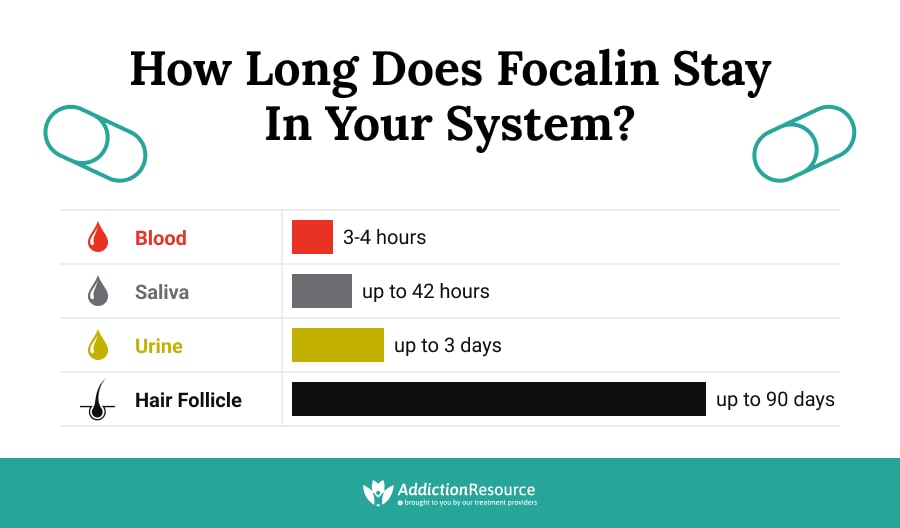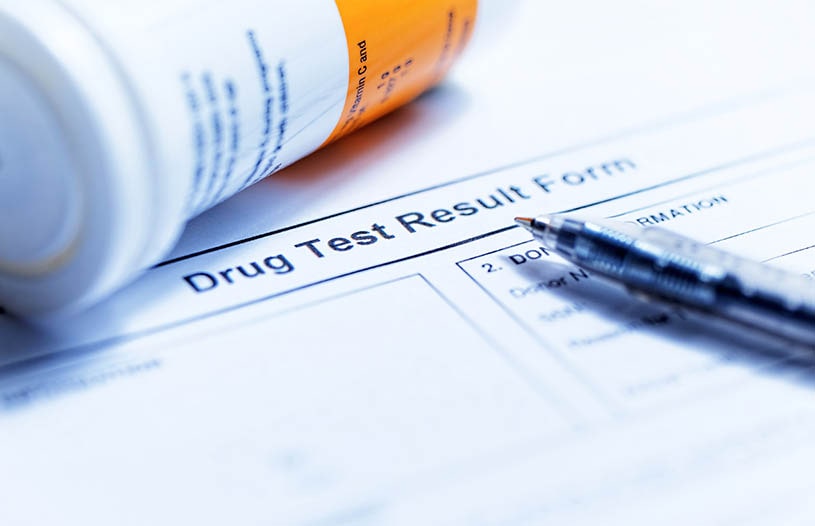Dexmethylphenidate, under the brand name Focalin, is one of the stimulant medications that is used to treat Attention Deficit Hyperactivity Disorder or ADHD. It comes in a plain and extended release form (Focalin and Focalin XR). In 2018, the estimated number of patients in the United States who were under treatment with this medicine was around 650,000.
Table Of Contents:
It is noteworthy that Dexmethylphenidate is a central nervous stimulant, which has a high potential for abuse, and it is classified as a Schedule II controlled substance by the Drug Enforcement Administration. For this reason, it is important to understand why being familiar with Focalin half-life is a must, especially because a Focalin drug test can be requested for employment.
In this article, information about Focalin half-life, mechanism of action, Focalin and Focalin XR duration of effects, how long does Focalin stay in your system, and what are the factors that affect the time it stays in the body, Focalin drug test, and how to remove it from the body safely will be given.
How Does Dexmethylphenidate Work?
Dexmethylphenidate, like Methylphenidate, also used to manage narcolepsy, is one of the Central Nervous System (CNS) Stimulant medications that contains Dexmethylphenidate hydrochloride as its active ingredient.
It is chemically similar compared to the first line ADHD medication, Methylphenidate and its labeled indication is for the treatment of Attention Deficit Hyperactivity Disorder (ADHD) in children (≥6 years), adolescents, and adults.
Furthermore, although exact information on this drug’s mechanism of action and how taking Dexmethylphenidate help treat ADHD is unknown, it is surmised that it increases the availability of Dopamine and Norepinephrine in the Central Nervous System by blocking their neuronal reuptake and increasing their release in extraneuronal spaces. These two monoamines are thought to be deficient in ADHD, and by increasing their availability Dexmethylphenidate reduces symptoms of hyperactivity, impulsivity, and/or inattention.
Focalin Half-Life
Focalin half-life may vary depending on the type used. For most people, the immediate-release version has a mean plasma elimination half-life of approximately 2.2 hours while Focalin XR half-life is a little longer, ranging between 5-7 hours. One main reason why Focalin XR half-life differs from the other form is that the time when they exert their effects differ as well. Focalin XR duration of effects stay different from the plain version of the medication. More information about these differences will be explained in the next sections.
Moreover, according to the FDA, it is important to know that the excretion and metabolism of a patient also plays a big role when it comes to the Focalin XR half-life and Dexmethylphenidate plain half-life, and children tend to have slightly shorter half-lives compared to adult patients. Also, age, dose, and drug interactions can impact the Focalin half-life.

How Long Does Focalin XR Last?
Dexmethylphenidate XR is the extended release version of Dexmethylphenidate and it comes in a capsule form that contains 50% short-acting beads and 50% enteric-coated, delayed-release beads. So, how long does Focalin XR last? Focalin XR duration of effects last for up to 12 hours and compared to the plain version of Dexmethylphenidate, the extended release’s maximum concentration in the blood is reached two times: first, 1.5 hours after ingestion and second, 6.5 hours after ingestion.
For This Reason, The Time the Extended Release Form Stays In the Urine, Blood, Hair, and Saliva Differs As Well. Below Is Information About This:
| Stays In | Detected |
| Urine | 4 days |
| Blood | 3 hours |
| Hair | 120 days |
| Saliva | 72 hours |
Knowing the information above is important especially when a person who is under treatment with Dexmethylphenidate is required to do some drug and laboratory tests.
Aside from this, understanding the facts above is a great way for every patient or parent of children with Attention Deficit Hyperactivity Disorder to learn about what happens to the drug after ingestion and how long its effect can be seen.
How Long Does Focalin Last?
Focalin, also known as the immediate-release version, is quickly absorbed in the body after administration. So, how long does Focalin last? After 1 to 1.5 hours, this drug will have its maximum concentration in the blood and per dose, its effects will last for about 4 hours
The Information About How Long It Stays In the Urine, Blood, Hair, and Saliva Is As Follows:
| Stays In | Detected |
| Urine | 3 days |
| Blood | 3-4 hours |
| Hair | 90 days |
| Saliva | 42 hours |
The immediate-release version of Dexmethylphenidate is clearly different from the extended release version. It is important to take note of the form of the drug that is being used in order to understand more about how long their effects will last and how long the drug will stay in the system.

Focalin Drug Test
As a Schedule II controlled substance like Methylphenidate, Dexmethylphenidate is accepted for medical use in the United States despite having a high potential for dependence and abuse. A standard drug panel is not likely to show the presence of Dexmethylphenidate in the system, especially because the drug has a short half-life. However, there is still a possibility for a drug test to be positive, depending on the sensitivity of the test. Also, one reason why false-positive drug results occur is that ADHD medications including Dexmethylphenidate and its counterpart with shorter duration, Methylphenidate, are prescription versions of amphetamines.
If a patient received a positive result in a Focalin drug test, different metrics will be used to verify the positive result. If it is a false-positive, using the different metrics will show that the result is not amphetamine or methamphetamine. Moreover, a 10-panel drug test screens for the most frequently misused prescription drugs in the US, which includes Dexmethylphenidate.
So, if a patient is taking any medications, it is recommended to list them on the intake form before proceeding to the drug screening.

Factors That Affect How Long Dexmethylphenidate Stays in the Body
The time for the two forms of Dexmethylphenidate to stay in the system differs and the time they last in the body is affected by different factors aside from the metabolism of a patient.
Below Is Information About the Individual Factors That Can Impact the Time for This Drug to Stay In the System:
- Age: Aging is accompanied by progressive impairments in the functions of multiple organs which affect drug metabolism and excretion. In other words, younger and healthier patients get to eliminate medications faster compared to the elderly with health issues.
- Chronic Health Conditions: Dexmethylphenidate is being metabolized by the liver and excreted by the kidney. Any kidney or liver disorder that affects the functions of these organs can affect the clearance of Dexmethylphenidate.
- Body Mass: Increased body mass can affect the distribution, metabolism, and excretion of drugs from the system. Drugs stay in the system much longer as they tend to accumulate in fat tissues.
- Tolerance: Dexmethylphenidate is metabolized more quickly once tolerance has developed.
- Frequency and Dose: How long this drug stays in the system is greatly affected by the dosage and frequency of use. Heavy or long-term use causes high concentrations in the system, which can be detected for an extended period.
- Food: A high-fat breakfast can increase the concentration of this drug in the system by delaying metabolism and excretion.
- Alcohol interactions: Alcohol mixed with Dexmethylphenidate or Methylphenidate can release more of the drug into the bloodstream and this will make it longer for the medicine to be eliminated in the system.
Knowing the factors that affect how long this medicine or any other medications alternative to Focalin stay in the system is very important during drug treatment. Avoiding foods that can alter the effects of the medication will help a patient optimize the use of the drug.
Additionally, knowing the patient’s health condition and individual factors will also help the medical health professionals in the proper dosing of the drug.
How to Remove Dexmethylphenidate From the System Safely
People who take the right dose of Dexmethylphenidate are not likely to suffer from Dexmethylphenidate’s emotional side effects and addiction, or discomforting Focalin withdrawal, hence should not be concerned about removing Dexmethylphenidate faster from the system. However, those who present with signs and symptoms of CNS overstimulation due to excessive sympathomimetic effects should take measures to speed up metabolism and excretion of the medication faster. Moreover, the goal is not only faster removal but is also about safe removal of the drug from the system.
Below Are Some Tips on How to Safely Remove This Medicine From the Body:
- Reach out to a medical professional as this professional is the only one who will be able to tell the patient about the faster and safer way to remove the medication from the body.
- Eat healthy foods (avoid fatty foods) and avoid alcohol in order to not delay the elimination of Dexmethylphenidate in the system.
- Take note of drug interactions in order to not exacerbate the level of Dexmethylphenidate in the system.
- Stay hydrated.
People abusing this or any other stimulant medications may require specific measures to flush the medication from the body. One of the safest options is the detoxification procedure in the substance addiction recovery center. The qualified medical specialists will work out the treatment plan for drug abuse that will meet all the individual requirements of each patient.
Hope Without Commitment
Find the best treatment options. Call our free and confidential helpline
Most private insurances accepted
Page Sources
- Barras, M., & Legg, A. (2017). Drug dosing in obese adults. Australian prescriber, 40(5), 189.
- Berman, S. M., Kuczenski, R., McCracken, J. T., & London, E. D. (2009). Potential adverse effects of amphetamine treatment on brain and behavior: a review. Molecular psychiatry, 14(2), 123-142.
- Brams, M., Silva, R., Straughn, A., Mitzel, H., Vince, B., Kelsh, D., & Schaffer, S. (2020, October). Comparative Bioavailability and Safety of a Novel Trimodal Dexmethylphenidate Tablet in ADHD Patients. In Journal Of The American Academy Of Child And Adolescent Psychiatry (Vol. 59, No. 10, Pp. S150-S151). Ste 800, 230 Park Ave, New York, Ny 10169 Usa: Elsevier Science Inc.
- Palatini, P., & De Martin, S. (2016). Pharmacokinetic drug interactions in liver disease: An update. World Journal of Gastroenterology, 22(3), 1260.
- Patrick, K. S., & Straughn, A. B. (2016). Absorption differences between immediate-release dexmethylphenidate and dl-methylphenidate. Drug Metabolism and Disposition, 44(3), 418-421.
- Mangoni, A. A., & Jackson, S. H. (2004). Age‐related changes in pharmacokinetics and pharmacodynamics: basic principles and practical applications. British journal of clinical pharmacology, 57(1), 6-14.
- Sean P. Kane, P. (2018). Dexmethylphenidate Hydrochloride. Retrieved from https://clincalc.com/DrugStats/Drugs/DexmethylphenidateHydrochloride

 Authored by
Authored by  Reviewed by
Reviewed by 
